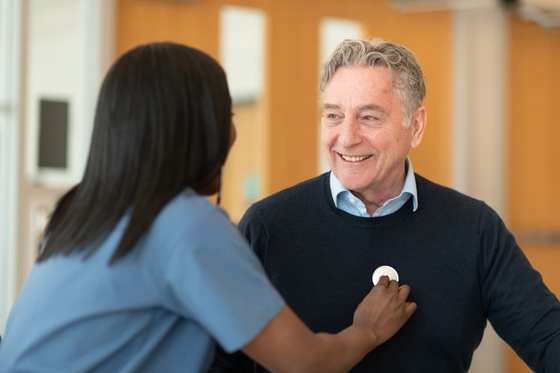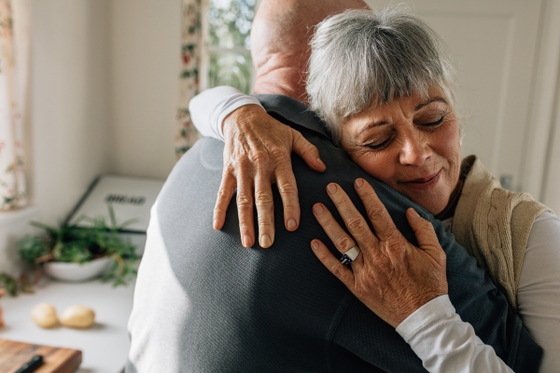
Relationships and sex after a heart attack
Key takeaways
2 min read
- It’s normal for relationships to change after a heart attack.
- Know that it’s possible to enjoy sex and intimacy again after a heart attack. A healthy sex life can help to lower stress and strengthen your connection with your partner.
- Some medicines can affect your sex life but there are simple solutions that can help.
Navigating relationships and sex during your heart attack recovery
It’s not unusual for changes in your health to affect your relationships in some way. After a heart attack, your relationships and sex life may change. It’s important to talk about this and seek help if you need it. The good news is that most concerns can be overcome.
Relationships
After you’ve had a heart attack, you may find that some of your relationships are different. For example, your role at home might have changed. Try to be patient with yourself while you adjust.
The best thing you can do is talk about how you’re feeling. It might be hard, but it lets people know how they can help. Some couples find it easier to talk with a relationship counsellor.
Hearing from other people who have been through a similar experience as you can help too. You might like to join one of the Heart Foundation’s online peer support communities:
- The MyHeart MyLife online support community is a safe virtual space for adults living with a heart condition in Australia to give and receive support from others on a similar journey. We also welcome caregivers, loved ones, friends and family supporting people living with a heart condition.
- The Supporting Young Hearts online support community is for people aged 18-45 years (and their support people). Members can share their experiences and give and receive support from others on a similar journey.
Sex and intimacy
After a heart attack, it’s normal to feel less interested in sex for a while. You might feel like you don’t have enough energy, or you may be worried about putting strain on your heart. Some medicines can also affect your sex drive.
If you have concerns, raise them with your doctor. They can give you guidance on when you can start having sex again. This is especially important if you’ve had heart bypass surgery.
It’s also important to be open with your partner. Tell them about your worries, fears and wishes about having sex again. Speaking about these things means you can work together to find a solution.
Some general tips:
- Sex is considered a mild to moderate physical activity. As a general rule, if you can climb two flights of stairs without pain or shortness of breath, then you should be OK to have sex.
- Timing is important. Make sure you’re well rested and don’t rush – have lots of time to enjoy each other. Avoid sex after eating a large meal, drinking alcohol or when you’re feeling tired.
- Make sure you’re relaxed. Creating a romantic atmosphere can help reduce anxiety or stress.
- Take things slow. At first, try to be the less active partner. You can start with activities that take less energy, such as an erotic massage or touching, which can still fulfil your needs and your partner’s.
- Some sexual positions may be more comfortable and can ensure you avoid stress on your breastbone if you’ve had surgery.
- Remember, there are other ways to feel connected. Kissing, cuddling, holding hands and just spending time together can make you feel close and loved.
- Making heart-healthy changes are good for both your heart and your sex life. Eating well, being physically active and getting plenty of sleep are important.
- If you experience chest pain or any other warning signs of a heart attack while having sex, stop immediately. If your symptoms are severe, getting worse or not going away, call Triple Zero (000). If your symptoms disappear when you stop having sex, it’s still important to see your GP or cardiologist for advice.
Medicines and sex
Some heart medicines can affect your sex life by reducing your desire for sex. Some can cause physical changes that can make sex uncomfortable. Some other types of medicines, such as antidepressant medicines, can also affect your ability to have an erection or an orgasm.
Some simple tips:
- Try lubricant (you can buy this from the pharmacy or supermarket). This can help women with vaginal dryness.
- Plan to have sex before you take your blood pressure medicine (blood pressure medicines can affect the ability to get an erection).
- There are some over-the-counter medicines that claim to help with sex drive. Before taking these medicines or supplements, speak with your doctor. Some of these medicines or supplements may affect your prescribed heart medicines.
If you think your medicines are impacting your sex life, speak with your doctor. They will be able to provide advice and suggestions. Remember, never stop taking your medicines or change the dose without talking with your doctor first.
Erectile dysfunction
After a heart attack, some men can experience erectile dysfunction. This means that they’re unable to achieve or maintain an erection. It’s common, and can be caused by things like medicines, stress, other medical conditions, anxiety or depression.
Erectile dysfunction medicines or other aids can help. However, some medicines to treat erectile dysfunction can cause your blood pressure to become very low, if you also take angina medicines (for example, GTN). Speak to your doctor for more information.
Seeking help
• If you’re having problems with sex and intimacy, there is support available. Speak to your doctor in the first instance.
• Find out more about erectile dysfunction on the Healthdirect website. The Healthy Male website also includes information on the link between erectile dysfunction and heart disease.
• Learn more about common feelings and emotions after a heart attack. If you’re finding yourself feeling down or anxious, reach out to support services like Beyond Blue (1300 22 4636).
References
- Erectile dysfunction medicines. Healthdirect. 2023. Accessed 11 Mar 2025. https://www.healthdirect.gov.au/erectile-dysfunction-medicines
- Erectile dysfunction. Healthy Male. 2020. Accessed 11 Mar 2025. https://healthymale.org.au/mens-health/erectile-dysfunction
- Phosphodiesterase 5 inhibitors. Australian Medicines Handbook. 2025. Amhonline.amh.net.au
You might also be interested in...

Heart attack recovery – your next steps
Explore the Heart Foundation’s guide on the next steps you can take to recover after a heart attack and get back to doing the things you love.

Support after a heart attack
Many different thoughts may go through your head after a heart attack and you may be presented with complicated medical info. Know where to get support.

Physical activity after a heart attack
Discover what you need to know about being active after a heart attack.
Last updated14 October 2025
